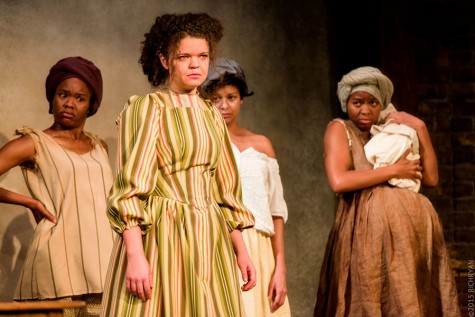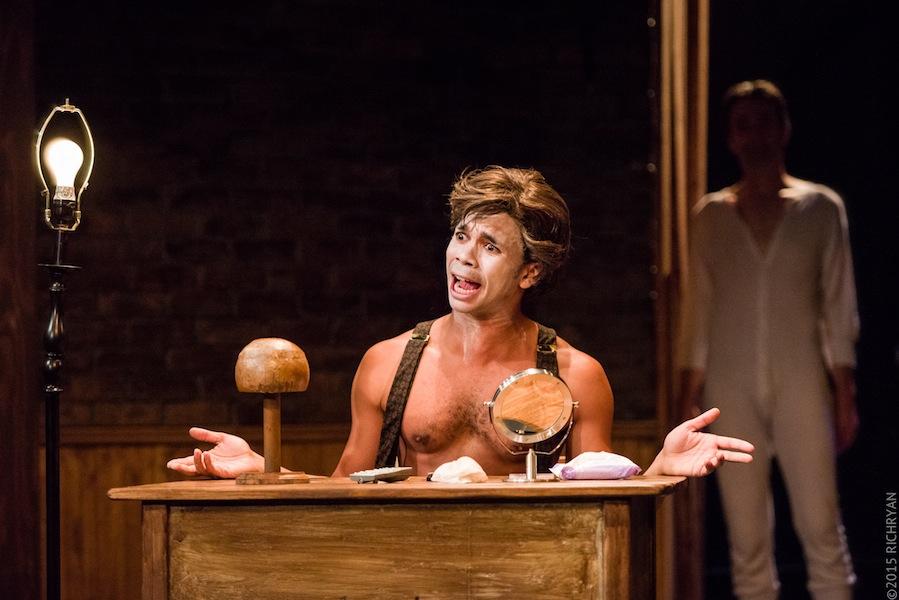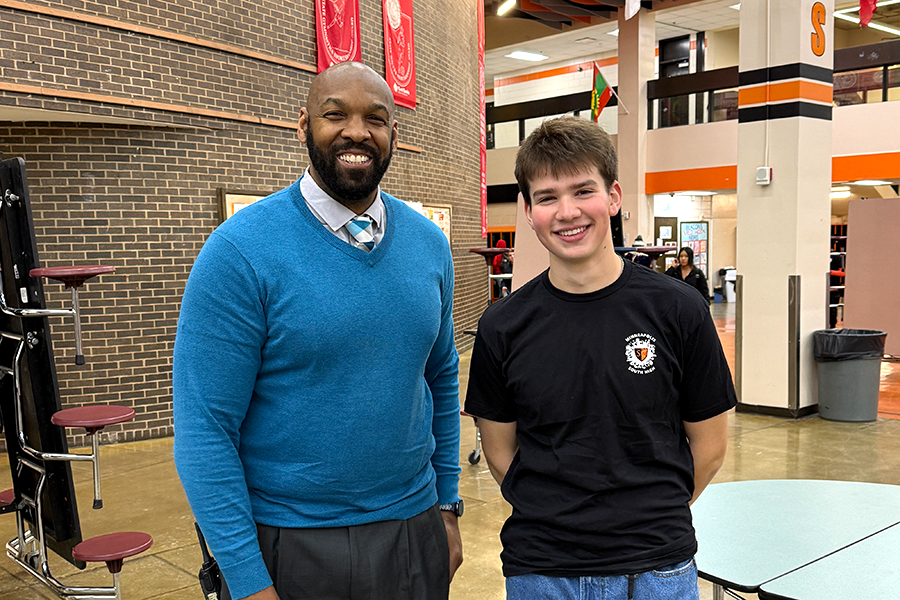Mixed Blood Theatre’s ‘An Octoroon’ evokes important conversations about race
William Hodgson as playwright Branden Jacobs-Jenkins during a performance of “An Octoroon” at Mixed Blood Theatre. “An Octoroon” is a modern adaptation of a show written in 1859 about an interracial love affair. “An Octoroon” creates a necessary space for theatregoers to contemplate the hideousness of American slavery through energetic acting and candid humor.
November 5, 2015
“Terrified.” “Unexpected.” “Mess.” “Injustice.” These are words audience members used to describe “An Octoroon,” a play at Mixed Blood Theatre that Project SUCCESS recently offered South students tickets to.
“An Octoroon,” a 2014 play by Branden Jacobs-Jenkins and directed by Nataki Garrett at Mixed Blood, is based upon a 19th century antebellum melodrama by Dion Boucicault called “The Octoroon.” “The Octoroon,” a popular production of its time, tells the story of an illicit love affair between a plantation owner and a woman of mixed race. While “The Octoroon” is dated and rarely performed today, “An Octoroon” adapts the script into a wider, modern interpretation of race.
Confronting race is not comfortable, but “An Octoroon” proves it shouldn’t be- race is complex, emotional, and deeply historical to the United States. “An Octoroon” creates a necessary space for theatregoers to contemplate the hideousness of American slavery through energetic acting and candid humor.
“I had read the script for “An Octoroon” ahead of time, so I knew how challenging and provocative it was going to be for students,” Marc Bromaghim-Oropeza, one of South’s Project SUCCESS facilitators stated. Bromaghim-Oropeza had previously seen the show with 91 South students through the Partnership Program. He later extended invitations to the entire student body. “My biggest difficulty was figuring out how to invite students to a show that wanted to poke and prod the audience’s comfort zone,” Bromaghim-Oropeza continued.
Poked and prodded my comfort zone was. While watching “An Octoroon,” I was thrown into the performance with all of my senses. A Childish Gambino track blares throughout one scene and a death metal song the next. Audience members are invited to participate in a slave auction scene. Cast members put on blackface, paint their faces white, and one actor puts on red makeup to play a Native American character.

Jasmine Hughes, Megan Burns, Jamila Anderson and Chaz Hodges.
“An Octoroon” doesn’t shy away from presenting racism and stereotypes that existed in the 19th century South. But this history isn’t stuck in the past. The intensity and satirical character of the play reminds audience members of the prolonged racism that exists today.
“There is this one point during the show where they cut the lights and the music and all they show is a projection of two black lynch victims hanging,” Bromaghim-Oropeza described. “The theater was filled with a nervous silence. Some students didn’t seem to know how to handle the moment, and a smattering of barely audible comments and nervous laughter followed. It was almost as if at that moment, the racism that was dealt with rather lightly at the beginning of the show became real. It had a face, a consequence. Racism wasn’t just something that could offend people, it was something that could KILL people. It was incredible to witness.”
After final bows, Mixed Blood provided time for audience members to discuss the performance they just witnessed. Viewers talked about their reactions to the two photographs, the use of blackface, and speculated about the ending of the show. Cast members filtered into the audience during the dialogue.
Students who attended the play with the Partnership Program also participated in a post-play discussion.
“One student made a comment about how blackface isn’t around anymore,” Bromaghim-Oropeza recounted. “One of the actors responded by saying that even though blackface isn’t a thing we see on actors any more, the same racial stereotypes are still being written into scripts in plays, television, and films. Blackface is alive, just hidden underground.”
When asked by an audience member what made them want to perform in “An Octoroon,” actors gave answers from “[the production was] a challenging piece of theatre” to wanting to “tell the story with integrity.”
Through “An Octoroon,” Mixed Blood continues to carry on its tradition of culturally inclusive, relevant, and bold productions that stay with you after you leave the theater.
“If anything, I want to know if any students who saw it had an urge to create change,” Bromaghim-Oropeza expressed. “So many of them saw through the show that racism is still alive and being kept alive by narratives that use stereotypes to their advantage. I hope that they find the inspiration to create positive change.”
Although students can no longer get tickets to “An Octoroon” through Project SUCCESS, free tickets are available through Mixed Blood Theatre’s Radical Hospitality. Tickets are pay-what-you-can starting two hours before each show. An Octoroon runs through Sunday, November 15.





